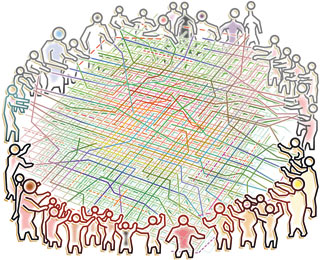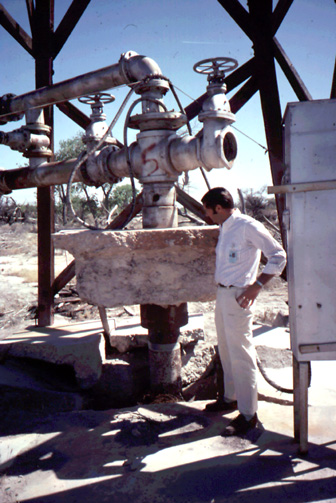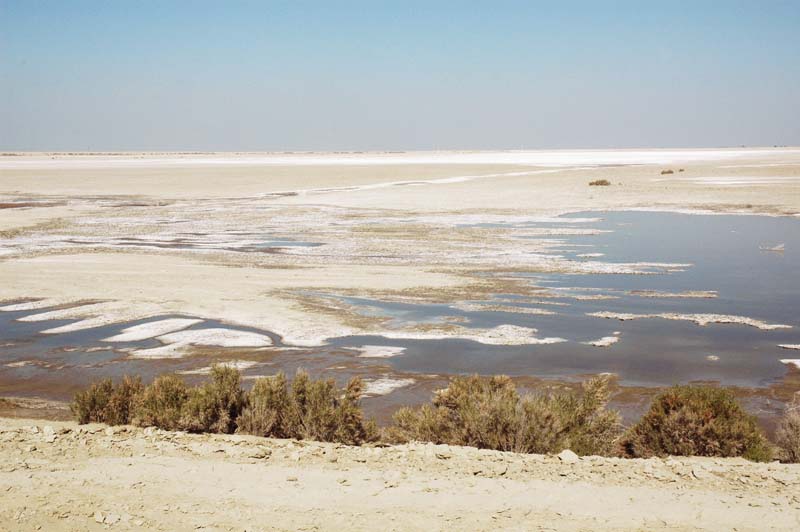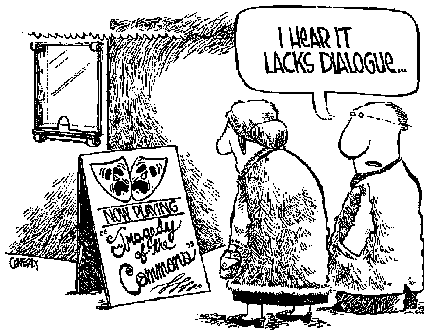The Tragedy of the Commons
Revisited
TAKE 1
In Garrett Harding's classic piece "The Tragedy of the Commons," a commons is a natural resource shared by many individuals.
In this context, "shared" means that each individual does not have a claim to any part of the resource, but rather, to the use of a portion of it for his/her own benefit.
1. The Tragedy of the Commons

|
Fig. 1 People and the Commons.
The tragedy is that, in the absence of regulation, each individual will have a tendency to exploit the commons to his/her own advantage, typically without limit.
Under this state of affairs, the commons is depleted and eventually ruined.
At the root of the tragedy is the unrestrained self-interest of some individuals.
The underlying reasoning is that if the commons is eventually going to be used up, whoever effects the greatest use stands to benefit the most.
Under this circumstance, it is seen that the benefit/cost ratio is astronomical: While the benefits accrue solely to the user, the costs are spread among all others sharing the commons.
Harding's Tragedy is not only a tenet of environmental science, it is also very common, no pun intended.
To understand why, we must examine the way Nature works.
Most natural resources are held in common, i.e., shared by many.
For instance, our atmosphere is really the quintessential commons.
No group or country can claim exclusive ownership of it.
Diffusion acts to equalize all constituents, such that the causes of some actions are the effects on others.
No better example comes to mind than that of global warming.
The excessive pumping of carbon dioxide into the atmosphere by some countries results in the melting of glaciers elsewhere around the planet.
 
|
Fig. 2 Retreat of Ururashraju glacier, White Range, Peru: 500 m between 1986 and 1999.
TAKE 2
Another example of a typical commons is groundwater.
Nobody really owns the groundwater; technically, it is up for grabs.
However, individual pumping of too much groundwater can result in the
depletion of the resource, to say nothing of other related effects or losses, such as land subsidence and salt-water intrusion.
2. Groundwater

|
Fig. 3 Land subsidence due to groundwater depletion, Las Vegas, Nevada (John W. Bell).
Again, diffusion acts to spread the effect of the individual's use among all.
Eventually, depletion by a few means a loss for all.
TAKE 3
Unlike groundwater, surface water is subject to appropriation, and this is the practice in the United States.
Therefore, one may think that surface water is not a commons.
However, the real issue is more subtle than it appears.
Surface water carries solids in the form of suspended sediments and dissolved salts.
Surface water acts as the means of carrying these solids
from source in the mountains to sink in the oceans, for peripheral continental basins.
Every iota of consumptive use of water, for instance, for irrigation, encroaches upon the right of Nature to export the solids, particularly the salts,
to the ocean.
It is seen that this "right" is a commons; i.e., by definition, a resource that could be used by many and abused by a few.
Taking most, or all, of the runoff
and converting it into evaporation and evapotranspiration, as is usually the case in highly developed basins, wastes the commons' right to export the salts,
resulting in the eventual ruin of the land.
Again, the omnipresent diffusion takes its toll.
The salts are diffused locally and end up polluting the local and subregional surface and groundwater,
laying waste to neighboring ecosystems.
3. Surface-water quality

|
Fig. 4 Evaporation pond, Tulare Lake basin,
Central valley, California.
Thus, while surface water quantity may not be a commons in practice, surface water quality clearly is.
One does not need to dig too deep to realize that most natural resources are actually commons.
Thus, Harding's Tragedy is indeed very common.
It presents itself almost everywhere, particularly in situations where the rights of the individual are pitted against those of the community.
Societies that want to remain sustainable have no choice but to regulate the use of the commons.
Regulation is the price to pay for sustainability.
It is the least undesirable strategy, since an unregulated commons eventually marches itself toward ruin.
TAKE 4
Let's test your understanding of the commons with a simple multiple-choice question.
Assume that there are several people on a boat in a lake or ocean.
4. A test of commons

|
Fig. 5 Boat people (imo.org)
All of a sudden, one of them goes crazy, pulls out a drill and starts drilling a hole in the hull.
The rest have three choices:
- Watch the drilling and examine how fast the driller makes a hole in the hull,
- Grab a lifejacket and jump out of the boat, because it is obvious that the boat is going to sink eventually, or
- Stop the culprit and throw the drill overboard to avoid the repetition of such an unfortunate incident.
| Choice | Action |
| A | Watch the drilling and examine how fast the hole is made |
| B | Grab a lifejacket and jump out of the boat |
| C | Stop the culprit and throw the drill overboard |
If your answer is A, you do not know that the boat is actually a commons, so you fail the test.
If your answer is B, you know that the boat is a commons, but you do not know that it is "your" commons, so you fail too.
If your answer is C, you know that the boat is a commons and you are ready to defend its integrity, because your security and comfort depends on it.
Most people would agree that the most sensible answer is C.
In conclusion, the rights of the individual are seen to end where the rights of the commons start.
Conversely, the rights of the commons end with the rights of the individual.
Thus, an appropriate balance between these two rights is the only sustainable course to take if we are to avoid a repetition of "The Tragedy of the Commons."

|
Fig. 6 Tragedy of the Commons (fao.org)
Narrator: Victor M. Ponce
Music: Fernando Oñate
Editor: Flor Pérez
Credits: http://tragedy.sdsu.edu
Copyright © 2010
Visualab Productions
All rights reserved